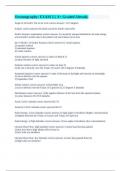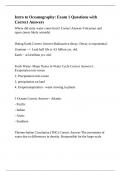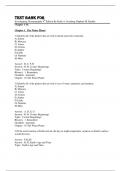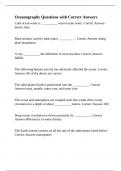Ocea - Study guides, Class notes & Summaries
Looking for the best study guides, study notes and summaries about Ocea? On this page you'll find 856 study documents about Ocea.
Page 2 out of 856 results
Sort by

-
Oceanography Ch. 1-4 Exam Questions with correct answers
- Exam (elaborations) • 19 pages • 2024
-
- $14.49
- + learn more
Pacific Ocean Correct Answer-Deepest and largest ocean Atlantic Ocean Correct Answer-Second largest ocean; separates the Old World from the New World Indian Ocean Correct Answer-Slightly smaller than the atlantic ocean but has the same average depth; mostly in the southern hemisphere Arctic Ocean Correct Answer-Smallest and shallowest ocean; has a permanent layer of sea ice Antarctic or Southern Ocean Correct Answer-Ocean that connects the pacific, atlantic and indian oceans; south o...

-
Oceanography: EXAM 2 || A+ Graded Already.
- Exam (elaborations) • 21 pages • 2024
-
Available in package deal
-
- $13.49
- + learn more
Angle of of Earth's Tilt on its Axis correct answers ~23.5 degrees Ecliptic correct answers the plane traced by Earth's solar orbit Earth's Seasons: explanation correct answers 1) caused by unequal distribution of solar energy across Earth's surface due to the planet's tilt and rotation on its axis the 4 "Marks" of Earth's Seasons correct answers 1) vernal equinox 2) summer solstice 3) autumnal equinox 4) winter solstice Vernal equinox correct answers 1) starts on March 21...

-
Oceanography || with 100% Correct Answers.
- Exam (elaborations) • 21 pages • 2024
-
Available in package deal
-
- $13.49
- + learn more
Hydrography correct answers density dependent on temperature and salinity Compare horizontal and vertical currents correct answers Horizontal currents are typically stronger than vertical. Most currents flow horizontally, while vertical movement is very localized. Describe the Geoid correct answers The Geoid is the shape that the surface of oceans would take under the influence of earth's gravity and rotation alone, in absence of winds and tides. It is the ocean surface at rest and mirror...

-
Oceanography 100 final SDSU Questions and Answers Already Passed
- Exam (elaborations) • 57 pages • 2024
- Available in package deal
-
- $11.99
- + learn more
Oceanography 100 final SDSU Questions and Answers Already Passed How was the solar system formed? -a supernova (explosion of a start when it runs out of fuel) -4.6 billion years ago how was the earth formed? -a nebula made of gas and dust -was formed 4.5 billion years ago how did oceans form? -A volcanic expulsion - rained for thousands of years -hit by an icy comets -volcanic out gassing and ice from comets when did life form? -3.7 billion years ago how long have ani...

-
Oceanography || with Complete Solutions.
- Exam (elaborations) • 18 pages • 2024
-
Available in package deal
-
- $13.29
- + learn more
3 major advantages of SEM over light microscope correct answers Resolution: the ability to distinguish fine detail, Magnification: can magnify objects thousands of times, and Depth of Field: much greater than a light microscope. 3-D image of surface samples. Uses an electron beam as its illumination source What length unit was mentioned frequently correct answers UM or micrometer Parts of an SEM correct answers Know it What lens is used? correct answers Objective, electromagnetic and co...

-
Oceanography final exam || with 100% Errorless Answers.
- Exam (elaborations) • 51 pages • 2024
-
Available in package deal
-
- $15.99
- + learn more
c correct answers 1. Where did all of the heavy elements that are found inside of your own body (e.g., carbon and nitrogen, phosphorous, copper and gold) get created? a. 50% of the heavy elements were created directly from the Big Bang and the other 50% were created later inside of stars or when stars exploded. b. 10% of the heavy elements were created directly from the Big Bang and about 90% were created later inside of stars or when stars exploded. c. 100% of the heavy elements were c...

-
Ocean 100 SacramentoGrilo Exam 1 with Complete Solutions
- Exam (elaborations) • 23 pages • 2024
- Available in package deal
-
- $9.99
- + learn more
Ocean 100 SacramentoGrilo Exam 1 with Complete Solutions science study of the physical, natural world through observations & experiments scientific method principles & empirical processes of discovery & demonstration considered characteristic of/ necessary for scientific investigation what are the steps of the scientific method? (1) observation (2) hypothesis (3) testing/experimenting (4) theory hypothesis idea proposed to explain 1 or more facts; must be testable & potentiall...
Test Bank For Investigating Oceanography 4th Edition By Keith A. Sverdrup, Raphael M. Kudela Chapter 1-16
Oceanography Questions with Correct Answer2

-
Intro to Oceanography: Exam 1 Questions with Correct Answers
- Exam (elaborations) • 15 pages • 2024
-
- $14.49
- + learn more
Where did early water come from? Correct Answer-Volcanoes and space (most likely astroids) Dating Earth Correct Answer-Radioactive decay: Decay is exponential. Uranium --> Lead half life is 4.5 billion yrs. old. Earth ~ 4.54 billion yrs. old. Fresh Water: Major fluxes in Water Cycle Correct Answer-1. Evaporation into ocean 2. Precipitation into ocean 3. precipitation on land 4. Evapotranspiration - water moving in plants 5 Oceans Correct Answer-- Atlantic - Pacific - Indian ...

Did you know that on average a seller on Stuvia earns $82 per month selling study resources? Hmm, hint, hint. Discover all about earning on Stuvia




